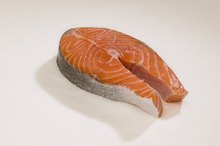Salmon & Skin Rash
According to the Food Allergy and Anaphylaxis Network, about 7 million Americans have a fish allergy, with tuna, halibut and salmon being the most allergenic fish 1. If you’re allergic to salmon, you will need to remain under a doctor’s care to prevent further complications. MayoClinic.com states that the most common rashes associated with a food allergy include hives, itchiness and eczema 1.
Salmon Allergy
If you’re allergic to salmon, you may or may not develop an allergic reaction from other species of fish, according to the Asthma and Allergy Foundation of America 2. After eating salmon, immune system cells identify the proteins found in the flesh of the salmon as dangerous. This mistake causes the body to defend itself by creating immunoglobulin E antibodies and histamine, according to MayoClinic.com 1. Antibodies attack the salmon proteins while histamine protects soft tissues from infection. The excessive amount of histamine created leads to inflammation throughout the body.
Skin Rashes
Salmon Fish Oil & Skin Rash
Learn More
Hives is the most common rash associated with an allergic reaction to salmon. Hives develop within a few minutes of consuming the salmon and may appear anywhere on your body. Most hives go away within a few days of eating salmon. If you have eczema, a chronic hypersensitivity of the skin, an allergic reaction can cause a flare-up. Eczema causes blisters to develop that are filled with liquid and are extremely itchy. General itching in your mouth, eyes and throughout your skin may also occur from a fish allergy.
- Hives is the most common rash associated with an allergic reaction to salmon.
- Hives develop within a few minutes of consuming the salmon and may appear anywhere on your body.
Dietary Modifications
If you are clinically diagnosed with an allergy to salmon, avoid all seafood unless directed otherwise by your doctor. Touching salmon or being around the preparation of salmon may trigger skin rashes, such as contact dermatitis. When eating out, inform your server of your food allergy to salmon to ensure any hidden sources on the menu 1. Prepackaged foods that contain any fish ingredients are required by law to place an allergy warning near the listed ingredients. Avoid imitation seafood meat if you are diagnosed with a fish allergy.
- If you are clinically diagnosed with an allergy to salmon, avoid all seafood unless directed otherwise by your doctor.
Warning
Symptoms of Salmon Allergy
Learn More
The Asthma and Allergy Foundation of America states that seafood-related allergies are one of the most common food allergens that leads to anaphylaxis, a severe allergic reaction 12. Symptoms of anaphylaxis include:
- hives
- facial
- lip
- throat or tongue swelling
- mental confusion
- lightheadedness
- a sudden drop in blood pressure
Related Articles
References
- MayoClinic.com: Food Allergy
- Asthma and Allergy Foundation of America: Seafood Allergies
- Fish, salmon, Atlantic, wild, raw. FoodData Central. U.S. Department of Agriculture. Published April 1, 2019.
- Fish faceoff: Wild salmon vs. farmed salmon. Cleveland Clinic. Updated 2014.
- Graff IE, Øyen J, Kjellevold M, et al. Reduced bone resorption by intake of dietary vitamin D and K from tailor-made Atlantic salmon: A randomized intervention trial. Oncotarget. 2016;7(43):69200-69215. doi:10.18632/oncotarget.10171
- American Heart Association. Eating Fish for Heart Health. Updated March 27, 2017.
- Collins K. The best winter foods for kids. Academy of Nutrition and Dietetics. Updated 2018.
- Fish: Friend or foe?. Harvard T.H. Chan School of Public Health. Updated 2020.
- Thomas J, Thomas CJ, et al. Omega-3 fatty acids in early prevention of inflammatory neurodegenerative disease: A focus on Alzheimer's disease. Biomed Res Int. 2015;2015:172801. doi:10.1155/2015/172801
- Galasso C, Orefice I, Pellone P, et al. On the neuroprotective role of astaxanthin: New perspectives?. Mar Drugs. 2018;16(8). doi:10.3390/md16080247
- Fish allergy. American College of Allergy, Asthma & Immunology. Updated 2019.
- Crinnion WJ. The role of persistent organic pollutants in the worldwide epidemic of type 2 diabetes mellitus and the possible connection to Farmed Atlantic Salmon (Salmo salar). Altern Med Rev. 2011;16(4):301-313.
- Bergkvist C, Kippler M, Larsson SC, et al. Dietary exposure to polychlorinated biphenyls is associated with increased risk of stroke in women. J Intern Med. 2014;276(3):248-259. doi:10.1111/joim.12194
- Jeffery A. Foran, David H. Good, David O. Carpenter, M. Coreen Hamilton, Barbara A. Knuth, Steven J. Schwager, Quantitative analysis of the benefits and risks of consuming farmed and wild Salmon, The Journal of Nutrition, Volume 135, Issue 11, November 2005, Pages 2639–2643, doi: 10.1093/jn/135.11.2639
- Salmon recommendations. Monterey Bay Aquarium Seafood Watch.
- Selecting and storing fresh and frozen seafood safely. U.S. Food and Drug Administration.
Writer Bio
Diane Marks started her writing career in 2010 and has been in health care administration for more than 30 years. She holds a registered nurse license from Citizens General Hospital School of Nursing, a Bachelor of Arts in health care education from California University of Pennsylvania and a Master of Science in health administration from the University of Pittsburgh.









